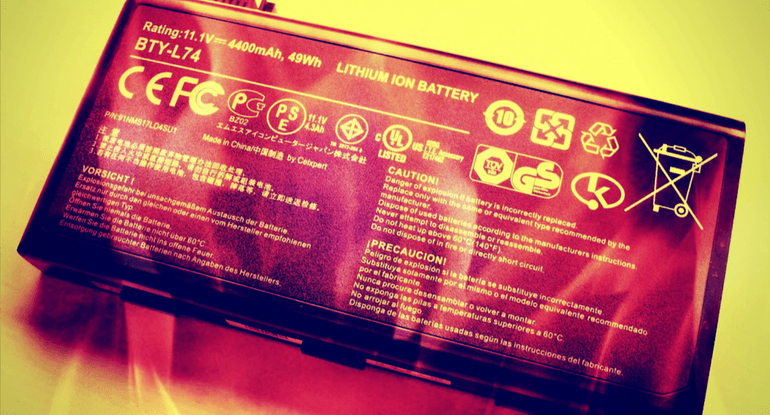 Lithium-ion batteries power many devices we consider essential to our daily lives: cell phones, power tools, e-cigarettes (vape devices), even Apple’s wireless earbuds. And lithium-ion batteries are touted as likely to change the face of automobile transport by functioning as the primary power source for electric vehicles.
Lithium-ion batteries power many devices we consider essential to our daily lives: cell phones, power tools, e-cigarettes (vape devices), even Apple’s wireless earbuds. And lithium-ion batteries are touted as likely to change the face of automobile transport by functioning as the primary power source for electric vehicles.
Most of the time these batteries work fine. But sometimes they don’t. And when they don’t, the results can be deadly.
Thomas and Pearl has reported on the dangers of lithium-ion batteries before and the injuries they have caused in e-cigarettes (vape devices). Most people still remember Samsung’s massive global recall of its Galaxy Note 7 smartphone due to these batteries catching on fire. There was even a strong advisory from the Federal Aviation Administration asking passengers not to use the Note 7– or even stow it in checked baggage. Airlines around the world hastened to ban the in-flight use and charging of the device.
But the use of lithium-ion batteries has continued, despite these injuries and incidents of fire and explosions. Recently here in Florida, a fiery Tesla crash and the death of two young South Florida students adds yet another incident to the list of tragedies that involve lithium-ion batteries.
Barrett Riley of Fort Lauderdale was driving a Tesla Model S sedan along the 1300 block of Seabreeze Boulevard in May of 2018. He, along with front-seat passenger Edgar Monserratt Martinez of Aventura was trapped after the vehicle crashed into a concrete wall and caught fire. Both 18-year-old students died in the crash. Another passenger, also 18, was taken to a hospital.

Wendy Mascolo, who lives near the crash site, was jogging when, through her headphones, she heard what sounded like a gunshot. “I took off running and when I came upon the scene,” she said, “the car was completely engulfed.”
Tesla Model S vehicles, like the one in the crash, are not powered by gasoline, but instead by a lithium-ion battery. Federal officials vowed to investigate the case, with the National Transportation Safety Board saying its team would investigate the crash with a “primarily focus on the emergency response in relation to the electric vehicle battery fire…”
“NTSB has a long history of investigating emerging transportation technologies,” said NTSB Chairman Robert S. Sumwalt, “such as lithium-ion battery fires in commercial aviation, as well as a fire involving the lithium-ion battery in a Chevrolet Volt… the goal of these investigations is to understand the impact of these emerging transportation technologies when they are part of a transportation accident.”
Tesla issued a statement about the fatal crash:
“Our thoughts are with the families and friends affected by this tragedy,” the company said. “The family who owned the car has been a close friend of Tesla for many years, and this hits us particularly hard.”
Are Teslas more likely to catch fire than other cars?
The data suggests that electric vehicles are not more prone to battery fires, but their lithium-ion batteries can create hotter fires that are harder to extinguish. What can happen with lithium-ion battery fires is ‘thermal runaway,’ or the spontaneous explosion of the battery thanks to a buildup of heat in the cells inside.
Lithium batteries have burned in commercial jet aircraft, been identified as a likely factor in a major fatal crash, and prompted the FAA to issue a recommendation restricting the bulk carriage of these batteries on passenger flights in 2010. In early 2016, the International Civil Aviation Organization banned outright the shipping of lithium ion batteries as cargo on aircraft carrying passengers…
Fuel for thought.

Have you or a loved one been injured due to a bad product?
If you or a loved one has been injured by a lithium battery explosion or fire, Thomas & Pearl offer you a free case consultation, and upon taking your case will work on a contingency basis.
Ask all the questions you want—do your research. You’ll pay no money upfront—only if Thomas & Pearl wins your case and gets you the compensation you deserve.
You can receive compensation damages to your vehicle, for your pain & suffering; for lost current and future wages, and medical expenses as well.
Before you speak with an insurance company, the attorneys at Thomas and Pearl want to speak to you.
$150 MILLION in verdicts and settlements
Injuries and deaths happen. It’s a fact. Sometimes they occur because of the negligence of another. Thomas & Pearl can help get you the compensation needed to safeguard your future.
Thomas & Pearl attorneys have the skills and training, plus the financial resources necessary to take on the big insurance companies, and to negotiate settlements favorable for our clients. And Thomas & Pearl Attorneys will absolutely litigate to protect your rights and get you the compensation you deserve.
Ask about our experience as attorneys helping victims of personal injury.
Ask about the more than $150M (MILLION) dollars in recent and past jury verdicts and settlements we have gained for our clients.
We’ll evaluate your case situation with you, develop a strategy to win or successfully negotiate the highest amount of compensation for you.
Experienced legal help can make the difference between a successful resolution and losing in court. And you pay nothing unless we get that successful resolution for you.
Contact Thomas & Pearl anytime.
![]()

![]()





